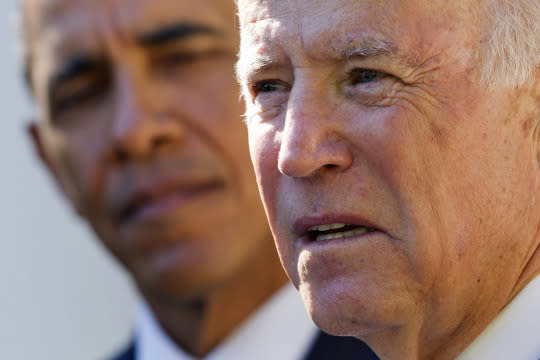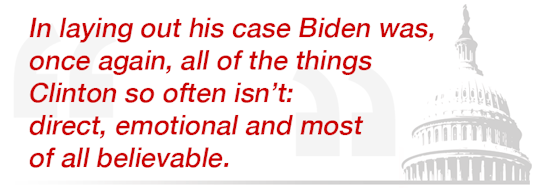What Biden’s speech said about his chances

President Obama listens as Vice President Joe Biden announces on Oct. 21 that he will not run for president. (Photo: Jacquelyn Martin/AP)
There will come a day, and probably soon, when Joe Biden will find himself saying great things about Hillary Clinton’s presidential prospects. But from the first few minutes of his hastily arranged announcement Wednesday, it was clear that day had not yet arrived.
While Clinton prepared to testify to a hostile committee on the other side of the avenue, trying yet again to put the email controversy behind her, Biden laid out both a pointed warning to her and the rationale for a campaign that might have been.
All of which demonstrated why he might actually have been a more formidable primary challenger — and yet, at the same time, a weaker general election candidate — than a lot of insiders assumed.
Biden’s talk in the Rose Garden was extraordinary, I thought, for its utter lack of retreat or expedience. The easiest thing for him to have done — the political thing — would have been to acknowledge that the party already had a solid field of candidates, chief among them his former colleague in the administration, and he had concluded that the situation didn’t merit his last-minute intervention.
Wednesday wasn’t the day for an endorsement, certainly, but the vice president could have made unity one of his main themes, and most party leaders in his position would have.
But the emotive Biden wasn’t feeling that particular kind of love. Flanked, significantly, by President Obama, Biden began by reluctantly saying that time had run out while he had grieved for his son. Not that he didn’t have the resilience for a campaign now, or that he had concluded there wasn’t a need for another candidate in the race, but rather that, in his words, “the window has closed.”
Then, without so much as mentioning Clinton, he launched into a powerful and heartfelt defense of the administration, pointedly cautioning other candidates against abandoning that legacy and vowing to be its vocal defender.
It’s hard to know exactly why Biden felt the need to sound such a defiant note where Clinton was concerned; for her part, Clinton was soft and solicitous when referencing Obama during the debate last week. Maybe he had Bernie Sanders in mind as much as he did her.
My guess, though, is that both Biden and Obama are still trying to get their heads around Clinton’s sudden disavowal of the Asian free trade deal, a baldly calculated (and slightly desperate) move that undermined one of the president’s most cherished initiatives at a moment when she could have shored up support for it. You could understand if neither of them is in the mood to coronate Clinton at the moment.
The unknowable question is: Could Biden have actually derailed her?
To the extent that we can generalize, the Washington wisdom about this, in both parties, has gone something like this in recent months: Biden didn’t have the resources, the organization or the popular support to mount a serious challenge among the primary electorate, unless Clinton outright imploded. But the irony was he might well have been a stronger nominee, because he has a better rapport with a lot of working-class voters and white men in particular.

To me, Biden’s brief statement showed why the opposite might have been true.
In laying out his case for the unfinished work of the Obama administration, Biden was, once again, all of the things Clinton so often isn’t: direct, emotional and most of all believable. He mixed in references to his own upbringing and his own family, as he often does, in a genuine way that made you forget that he was, at least mostly, reading from a prepared speech.
This would have been Biden’s great strength against Clinton, and it was almost certainly undervalued. Democratic primary voters might have warmed to his defense of the administration, or to his long record on civil rights or economic fairness. (His record on crime and sentencing is one he didn’t go out of his way to reference.) But it’s the contrast in tone and style that should have kept Clinton’s aides up more than a few nights in the last month.
Biden was trampling conventional wisdom when he said in the Rose Garden that money and filing deadlines have a way of working themselves out if you get into the race at the right moment, but he wasn’t wrong about that. And my suspicion is that a lot of his deficit in organization and funding would have been erased, in short order, by the sense of him as a guy who levels with you.
And yet, the argument Biden outlined yesterday — the one that would have underpinned his campaign — amounted to the case for a third Obama term. And here, had he become the nominee, he would have had a lot of historical precedent with which to contend.
As I’ve written before, third terms are something like the holy grail of presidential politics. In the 64 years since the ratification of the 22nd Amendment in 1951, which limited a sitting president to two consecutive full terms, only once have the voters given either party a third term. (That was in 1988, which was a strange and dispiriting political moment all around; if you want to learn more, I’ve got a book you should read.)
This isn’t coincidence. Increasingly in the modern era, for structural reasons in the economy, Americans are restless, dissatisfied and inclined toward new directions. The watchword of every election is “change”; after four years an incumbent can almost reasonably claim still to represent that change, but after eight it’s damn near impossible, and especially if your nominee has been in Washington for 40-plus years.
Barring some odd calamity in the other party (like, say, the nomination of Donald Trump), no Democrat is going to win a third term without articulating something that passes for a new direction. “More of the same” is kind of an underwhelming slogan for the average voter these days.
If Biden’s withdrawal speech is any indication, that’s about what his bumper sticker would have sounded like. And even had he triumphed in the primaries, where that message might have resonated with a lot of voters, it would have been a much harder sell next fall, when the current of history would have been carrying him in the wrong direction.
Biden did Clinton a solid favor when he decided to sit this last one out. But maybe he did himself one, too.

